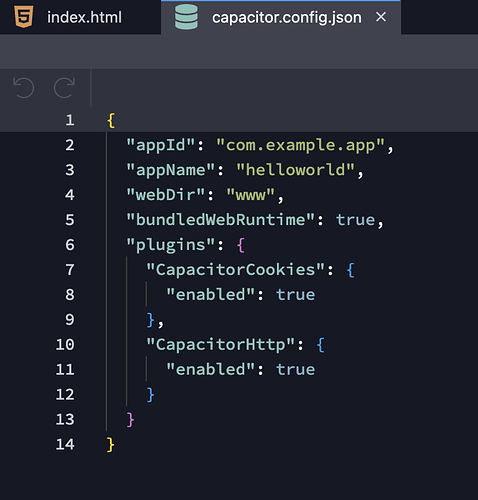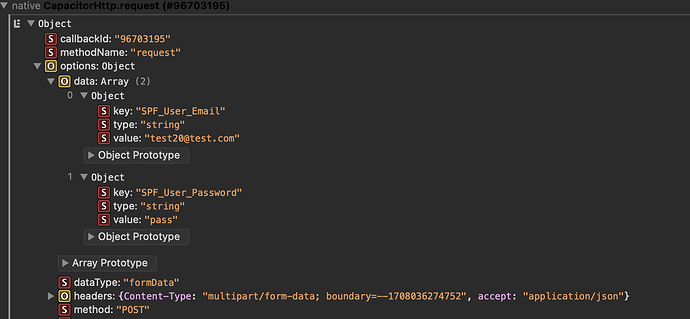var capacitorCommunityHttp = (function (exports, core) {
'use strict';
const Http = core.registerPlugin('Http', {
web: () => Promise.resolve().then(function () { return web; }).then(m => new m.HttpWeb()),
electron: () => Promise.resolve().then(function () { return web; }).then(m => new m.HttpWeb()),
});
/**
* Read in a Blob value and return it as a base64 string
* @param blob The blob value to convert to a base64 string
*/
const readBlobAsBase64 = async (blob) => new Promise((resolve, reject) => {
const reader = new FileReader();
reader.onload = () => {
const base64String = reader.result;
const base64StringWithoutTags = base64String.substr(base64String.indexOf(',') + 1); // remove prefix "data:application/pdf;base64,"
resolve(base64StringWithoutTags);
};
reader.onerror = (error) => reject(error);
reader.readAsDataURL(blob);
});
/**
* Safely web encode a string value (inspired by js-cookie)
* @param str The string value to encode
*/
const encode = (str) => encodeURIComponent(str)
.replace(/%(2[346B]|5E|60|7C)/g, decodeURIComponent)
.replace(/[()]/g, escape);
/**
* Safely web decode a string value (inspired by js-cookie)
* @param str The string value to decode
*/
const decode = (str) => str.replace(/(%[\dA-F]{2})+/gi, decodeURIComponent);
/**
* Set a cookie
* @param key The key to set
* @param value The value to set
* @param options Optional additional parameters
*/
const setCookie = (key, value, options = {}) => {
// Safely Encoded Key/Value
const encodedKey = encode(key);
const encodedValue = encode(value);
// Clean & sanitize options
const expires = `; expires=${(options.expires || '').replace('expires=', '')}`; // Default is "; expires="
const path = (options.path || '/').replace('path=', ''); // Default is "path=/"
document.cookie = `${encodedKey}=${encodedValue || ''}${expires}; path=${path}`;
};
/**
* Gets all HttpCookies
*/
const getCookies = () => {
const output = [];
const map = {};
if (!document.cookie) {
return output;
}
const cookies = document.cookie.split(';') || [];
for (const cookie of cookies) {
// Replace first "=" with CAP_COOKIE to prevent splitting on additional "="
let [k, v] = cookie.replace(/=/, 'CAP_COOKIE').split('CAP_COOKIE');
k = decode(k).trim();
v = decode(v).trim();
map[k] = v;
}
const entries = Object.entries(map);
for (const [key, value] of entries) {
output.push({
key,
value,
});
}
return output;
};
/**
* Gets a single HttpCookie given a key
*/
const getCookie = (key) => {
const cookies = getCookies();
for (const cookie of cookies) {
if (cookie.key === key) {
return cookie;
}
}
return {
key,
value: '',
};
};
/**
* Deletes a cookie given a key
* @param key The key of the cookie to delete
*/
const deleteCookie = (key) => {
document.cookie = `${key}=; Max-Age=0`;
};
/**
* Clears out cookies by setting them to expire immediately
*/
const clearCookies = () => {
const cookies = document.cookie.split(';') || [];
for (const cookie of cookies) {
document.cookie = cookie
.replace(/^ +/, '')
.replace(/=.*/, `=;expires=${new Date().toUTCString()};path=/`);
}
};
/**
* Normalize an HttpHeaders map by lowercasing all of the values
* @param headers The HttpHeaders object to normalize
*/
const normalizeHttpHeaders = (headers = {}) => {
const originalKeys = Object.keys(headers);
const loweredKeys = Object.keys(headers).map(k => k.toLocaleLowerCase());
const normalized = loweredKeys.reduce((acc, key, index) => {
acc[key] = headers[originalKeys[index]];
return acc;
}, {});
return normalized;
};
/**
* Builds a string of url parameters that
* @param params A map of url parameters
* @param shouldEncode true if you should encodeURIComponent() the values (true by default)
*/
const buildUrlParams = (params, shouldEncode = true) => {
if (!params)
return null;
const output = Object.entries(params).reduce((accumulator, entry) => {
const [key, value] = entry;
let encodedValue;
let item;
if (Array.isArray(value)) {
item = '';
value.forEach(str => {
encodedValue = shouldEncode ? encodeURIComponent(str) : str;
item += `${key}=${encodedValue}&`;
});
// last character will always be "&" so slice it off
item.slice(0, -1);
}
else {
encodedValue = shouldEncode ? encodeURIComponent(value) : value;
item = `${key}=${encodedValue}`;
}
return `${accumulator}&${item}`;
}, '');
// Remove initial "&" from the reduce
return output.substr(1);
};
/**
* Build the RequestInit object based on the options passed into the initial request
* @param options The Http plugin options
* @param extra Any extra RequestInit values
*/
const buildRequestInit = (options, extra = {}) => {
const output = Object.assign({ method: options.method || 'GET', headers: options.headers }, extra);
// Get the content-type
const headers = normalizeHttpHeaders(options.headers);
const type = headers['content-type'] || '';
// If body is already a string, then pass it through as-is.
if (typeof options.data === 'string') {
output.body = options.data;
}
// Build request initializers based off of content-type
else if (type.includes('application/x-www-form-urlencoded')) {
const params = new URLSearchParams();
for (const [key, value] of Object.entries(options.data || {})) {
params.set(key, value);
}
output.body = params.toString();
}
else if (type.includes('multipart/form-data')) {
const form = new FormData();
if (options.data instanceof FormData) {
options.data.forEach((value, key) => {
form.append(key, value);
});
}
else {
for (let key of Object.keys(options.data)) {
form.append(key, options.data[key]);
}
}
output.body = form;
const headers = new Headers(output.headers);
headers.delete('content-type'); // content-type will be set by `window.fetch` to includy boundary
output.headers = headers;
}
else if (type.includes('application/json') ||
typeof options.data === 'object') {
output.body = JSON.stringify(options.data);
}
return output;
};
/**
* Perform an Http request given a set of options
* @param options Options to build the HTTP request
*/
const request = async (options) => {
const requestInit = buildRequestInit(options, options.webFetchExtra);
const urlParams = buildUrlParams(options.params, options.shouldEncodeUrlParams);
const url = urlParams ? `${options.url}?${urlParams}` : options.url;
const response = await fetch(url, requestInit);
const contentType = response.headers.get('content-type') || '';
// Default to 'text' responseType so no parsing happens
let { responseType = 'text' } = response.ok ? options : {};
// If the response content-type is json, force the response to be json
if (contentType.includes('application/json')) {
responseType = 'json';
}
let data;
switch (responseType) {
case 'arraybuffer':
case 'blob':
const blob = await response.blob();
data = await readBlobAsBase64(blob);
break;
case 'json':
data = await response.json();
break;
case 'document':
case 'text':
default:
data = await response.text();
}
// Convert fetch headers to Capacitor HttpHeaders
const headers = {};
response.headers.forEach((value, key) => {
headers[key] = value;
});
return {
data,
headers,
status: response.status,
url: response.url,
};
};
/**
* Perform an Http GET request given a set of options
* @param options Options to build the HTTP request
*/
const get = async (options) => request(Object.assign(Object.assign({}, options), { method: 'GET' }));
/**
* Perform an Http POST request given a set of options
* @param options Options to build the HTTP request
*/
const post = async (options) => request(Object.assign(Object.assign({}, options), { method: 'POST' }));
/**
* Perform an Http PUT request given a set of options
* @param options Options to build the HTTP request
*/
const put = async (options) => request(Object.assign(Object.assign({}, options), { method: 'PUT' }));
/**
* Perform an Http PATCH request given a set of options
* @param options Options to build the HTTP request
*/
const patch = async (options) => request(Object.assign(Object.assign({}, options), { method: 'PATCH' }));
/**
* Perform an Http DELETE request given a set of options
* @param options Options to build the HTTP request
*/
const del = async (options) => request(Object.assign(Object.assign({}, options), { method: 'DELETE' }));
class HttpWeb extends core.WebPlugin {
constructor() {
super();
/**
* Perform an Http request given a set of options
* @param options Options to build the HTTP request
*/
this.request = async (options) => request(options);
/**
* Perform an Http GET request given a set of options
* @param options Options to build the HTTP request
*/
this.get = async (options) => get(options);
/**
* Perform an Http POST request given a set of options
* @param options Options to build the HTTP request
*/
this.post = async (options) => post(options);
/**
* Perform an Http PUT request given a set of options
* @param options Options to build the HTTP request
*/
this.put = async (options) => put(options);
/**
* Perform an Http PATCH request given a set of options
* @param options Options to build the HTTP request
*/
this.patch = async (options) => patch(options);
/**
* Perform an Http DELETE request given a set of options
* @param options Options to build the HTTP request
*/
this.del = async (options) => del(options);
/**
* Gets all HttpCookies as a Map
*/
this.getCookiesMap = async (
// @ts-ignore
options) => {
const cookies = getCookies();
const output = {};
for (const cookie of cookies) {
output[cookie.key] = cookie.value;
}
return output;
};
/**
* Get all HttpCookies as an object with the values as an HttpCookie[]
*/
this.getCookies = async (options) => {
const cookies = getCookies();
return { cookies };
};
/**
* Set a cookie
* @param key The key to set
* @param value The value to set
* @param options Optional additional parameters
*/
this.setCookie = async (options) => {
const { key, value, expires = '', path = '' } = options;
setCookie(key, value, { expires, path });
};
/**
* Gets all cookie values unless a key is specified, then return only that value
* @param key The key of the cookie value to get
*/
this.getCookie = async (options) => getCookie(options.key);
/**
* Deletes a cookie given a key
* @param key The key of the cookie to delete
*/
this.deleteCookie = async (options) => deleteCookie(options.key);
/**
* Clears out cookies by setting them to expire immediately
*/
this.clearCookies = async (
// @ts-ignore
options) => clearCookies();
/**
* Clears out cookies by setting them to expire immediately
*/
this.clearAllCookies = async () => clearCookies();
/**
* Uploads a file through a POST request
* @param options TODO
*/
this.uploadFile = async (options) => {
const formData = new FormData();
formData.append(options.name, options.blob || 'undefined');
const fetchOptions = Object.assign(Object.assign({}, options), { body: formData, method: 'POST' });
return this.post(fetchOptions);
};
/**
* Downloads a file
* @param options TODO
*/
this.downloadFile = async (options) => {
const requestInit = buildRequestInit(options, options.webFetchExtra);
const response = await fetch(options.url, requestInit);
let blob;
if (!(options === null || options === void 0 ? void 0 : options.progress))
blob = await response.blob();
else if (!(response === null || response === void 0 ? void 0 : response.body))
blob = new Blob();
else {
const reader = response.body.getReader();
let bytes = 0;
let chunks = [];
const contentType = response.headers.get('content-type');
const contentLength = parseInt(response.headers.get('content-length') || '0', 10);
while (true) {
const { done, value } = await reader.read();
if (done)
break;
chunks.push(value);
bytes += (value === null || value === void 0 ? void 0 : value.length) || 0;
const status = {
type: 'DOWNLOAD',
url: options.url,
bytes,
contentLength,
};
this.notifyListeners('progress', status);
}
let allChunks = new Uint8Array(bytes);
let position = 0;
for (const chunk of chunks) {
if (typeof chunk === 'undefined')
continue;
allChunks.set(chunk, position);
position += chunk.length;
}
blob = new Blob([allChunks.buffer], { type: contentType || undefined });
}
return {
blob,
};
};
}
}
var web = /*#__PURE__*/Object.freeze({
__proto__: null,
HttpWeb: HttpWeb
});
exports.Http = Http;
Object.defineProperty(exports, '__esModule', { value: true });
return exports;
}({}, capacitorExports));
//# sourceMappingURL=plugin.js.map




